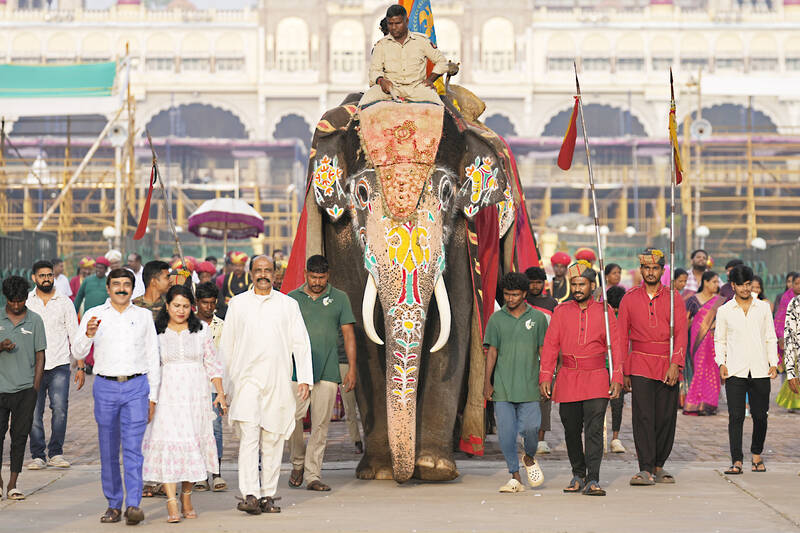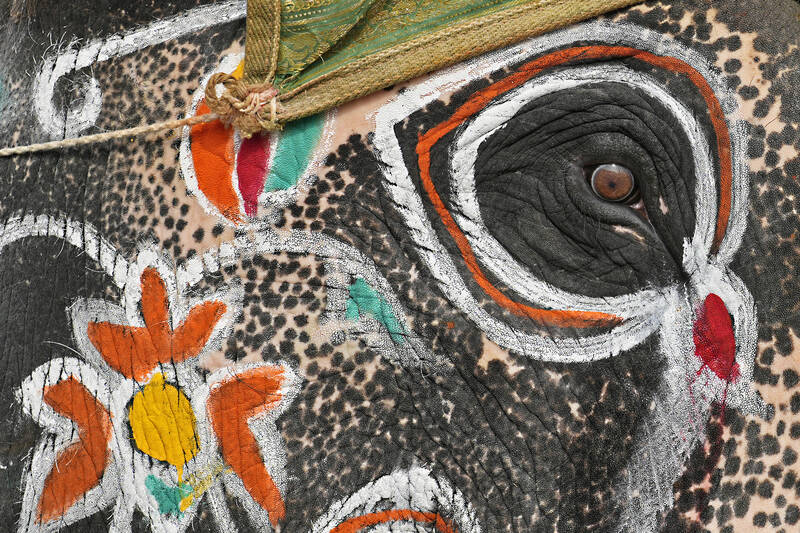A jumbo operation is moving 20 elephants across the breadth of India to the mammoth private zoo set up by the son of Asia’s richest man, adjoining a sprawling oil refinery.
The elephants have been “freed from the exploitative logging industry,” according to the Vantara Animal Rescue Centre, run by Anant Ambani, son of the billionaire head of Reliance Industries Mukesh Ambani, a close ally of Prime Minister Narendra Modi.
The sheer scale of the self-declared “world’s biggest wild animal rescue center” has raised eyebrows — including more than 50 bears, 160 tigers, 200 lions, 250 leopards and 900 crocodiles, according to the inventory from India’s Central Zoo Authority.

Photo: AP
The elephants are being transported the entire width of India, around 3,200 kilometers by road, from the misty forests of the northeast Himalayan state of Arunachal Pradesh to Jamnagar on the baking flatlands of Gujarat in the west.
It is a staggering journey, about the distance from Paris to Cairo, even for a zoo that has flown in animals from across the world.
The elephants include captive-born animals, some that had deep wounds from chains used by their handlers to control them and for dragging timber.

Photo: AP
They are being transported in “elephant ambulances” — specially adapted trucks — accompanied by a team of over 200 staff, including vets.
Photographs taken on their journey published by local media show the waving trunks of the elephants out the top of the slow-moving trucks.
The animals will eventually be housed alongside around 200 elephants already at the pet project of 29-year-old Anant, a vast operation that includes more than 2,000 animals from 43 species across a 3,000-acre site.
emotional recovery
“They will live chain-free and will never be forced into labour,” a statement from Vantara read, meaning “Star of the Forest” in Hindi.
They are to be homed in a site alongside the Reliance Jamnagar Refinery Complex, which the conglomerate also says is the world’s largest crude oil refinery. Summer temperatures there can soar above 50 degrees Celsius.
Indian social media has both posts praising the move — and those concerned that the endangered animals will be held in a private facility and not returned to the wild.
Two other elephants, from a Hindu temple complex in Mayapur in West Bengal state where they performed temple rituals, are also being brought to the zoo on a 2,300-kilometer journey. One of those elephants killed her keeper last year. Vantara said that “living in captivity causes significant mental suffering,” and insisted that their facility will now support the elephants’ “emotional recovery.”
Around 2,100 staff look after the animals at the zoo, according to Vantara.
The zoo was also among the many venues for Anant’s lavish muti-day wedding celebrations in 2024, parties that set a new benchmark in matrimonial extravagance — including private performances by R&B star Rihanna, Justin Bieber, Katy Perry, The Backstreet Boys and Italian tenor Andrea Bocelli.
Anant’s father Mukesh is chairman of Reliance Industries, a family-founded conglomerate that has grown into India’s biggest company by market cap.
Mukesh Ambani, who attended US President Donald Trump’s inauguration this week, is the world’s 18th richest person, with a fortune of more than US$95 billion, according to Forbes.

The unexpected collapse of the recall campaigns is being viewed through many lenses, most of them skewed and self-absorbed. The international media unsurprisingly focuses on what they perceive as the message that Taiwanese voters were sending in the failure of the mass recall, especially to China, the US and to friendly Western nations. This made some sense prior to early last month. One of the main arguments used by recall campaigners for recalling Chinese Nationalist Party (KMT) lawmakers was that they were too pro-China, and by extension not to be trusted with defending the nation. Also by extension, that argument could be

Aug. 4 to Aug. 10 When Coca-Cola finally pushed its way into Taiwan’s market in 1968, it allegedly vowed to wipe out its major domestic rival Hey Song within five years. But Hey Song, which began as a manual operation in a family cow shed in 1925, had proven its resilience, surviving numerous setbacks — including the loss of autonomy and nearly all its assets due to the Japanese colonial government’s wartime economic policy. By the 1960s, Hey Song had risen to the top of Taiwan’s beverage industry. This success was driven not only by president Chang Wen-chi’s

Last week, on the heels of the recall election that turned out so badly for Taiwan, came the news that US President Donald Trump had blocked the transit of President William Lai (賴清德) through the US on his way to Latin America. A few days later the international media reported that in June a scheduled visit by Minister of National Defense Wellington Koo (顧立雄) for high level meetings was canceled by the US after China’s President Xi Jinping (習近平) asked Trump to curb US engagement with Taiwan during a June phone call. The cancellation of Lai’s transit was a gaudy

The centuries-old fiery Chinese spirit baijiu (白酒), long associated with business dinners, is being reshaped to appeal to younger generations as its makers adapt to changing times. Mostly distilled from sorghum, the clear but pungent liquor contains as much as 60 percent alcohol. It’s the usual choice for toasts of gan bei (乾杯), the Chinese expression for bottoms up, and raucous drinking games. “If you like to drink spirits and you’ve never had baijiu, it’s kind of like eating noodles but you’ve never had spaghetti,” said Jim Boyce, a Canadian writer and wine expert who founded World Baijiu Day a decade